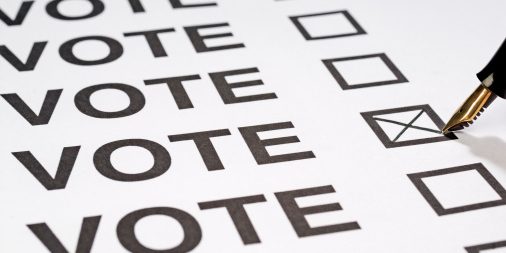On March 7, 2023, voters in Burlington, Vermont, will decide on at least seven ballot measures—five of which were placed on the ballot by the Burlington City Council, and two which were placed on the ballot by citizen initiative.
The council-referred measures are as follows:
- A charter amendment that would allow non-citizens who are legal residents to vote in municipal and school board elections
- A charter amendment that would require voters to be residents of a ward or city district if casting a ballot for certain local officers or local public questions, and to provide that the City Council determines the number and location of polling places in each ward
- A charter amendment that would redistrict city election boundaries
- A charter amendment that would provide that ranked-choice voting be established for elections for mayor, school commissioners, and ward election officers
- A measure that would implement a carbon pollution impact fee starting for “new construction buildings that install fossil fuel thermal energy systems,” and for existing commercial and industrial buildings that have installed fossil “fuel thermal energy space conditioning or domestic water heating systems”
The citizen-initiated charter amendments are as follows:
- A charter amendment that would establish an independent board to investigate, hear complaints, and impose discipline regarding a police officer’s actions or inactions
- A charter amendment that would provide citizens the ability to initiate ballot questions and repeal ordinances by majority vote and place the issue directly on the ballot, rather than requiring city council and mayoral approval to be placed on the ballot.
Independent oversight board regarding police
Regarding the police oversight board initiative, City Councilor Joe Magee said, “We need to be holding the police department to a higher standard of accountability and demanding more transparency from them.” James Lyall, the executive director of the ACLU of Vermont, said, “We believe that it’s really important to have independent involvement in police oversight, that it’s not enough to essentially leave it to police to police themselves… We’ve seen that; that can create real problems.”
Burlington Mayor Miro Weinberger (D), who opposes the initiative, said, “I think, arguably, if you were going to create some kind of citizen oversight board that’s the most important background for someone to have. But this sort of turns it on its head and says that that is disqualifying. And that’s offensive. It’s offensive to me. It’s offensive to someone who believes that law enforcement is an important profession that we need to respect. It’s certainly offensive to the people who serve and put their lives on the line every day for this community. It also completely removes the chief from any role in discipline which I think really fundamentally changes the chief’s role and makes it very hard for a chief to be successful.”
Noncitizen voting
A noncitizen voting measure was previously rejected by voters in 2015. Last year, the city council voted to refer the measure to the March ballot. City Councilor Gene Bergman (Vermont Progressive Party) said, “There are all these decisions that are made on a local level, in fact, this is where we live, we live here, we act here and it’s where most of the important things happen, and I believe people should have a stake in it.”
Ranked choice voting for mayor, school commissioners, and ward election officers
The charter amendment would implement ranked-choice voting (RCV) for mayoral, school commissioner, and ward election officer elections. Currently, in Burlington, RCV is used for city council elections. In March 2021, voters passed Question 4 to use RCV for city council elections. RCV allows voters to rank candidates in order of preference. If no candidate gets a majority, the candidate with the lowest amount of votes is eliminated, and votes for that candidate would instead be assigned to the second choice of those voters. The process would continue until one candidate receives the majority of votes.
Mayor Weinberger opposes the measure, saying, “I don’t think there’s a need to in the Burlington mayoral general election where we have a provision for a runoff if no one achieves a strong plurality, so I think it’s a mistake I think it’s problematic for a mayoral, general elections, but voters are going to get to weigh in and decide for themselves.” City Councilor Joan Shannon (D) supports the measure, saying that the process is better for voters. Shannon said, “What we really want to look for is a voting system that serves democracy, that engages the public and that produces a result that is reflective of the voters’ will.”
The measures will be decided by Burlington voters on March 7, 2023.


